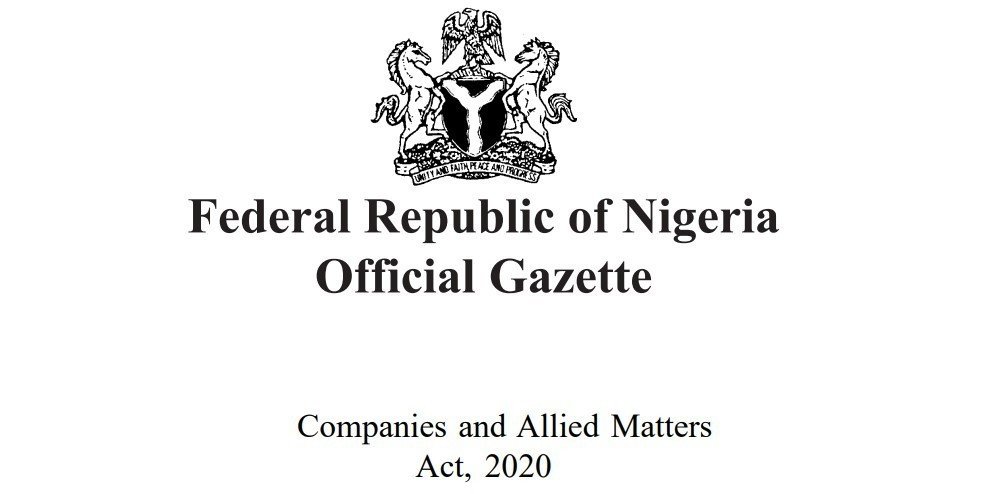The Companies and Allied Matters Act (CAMA) 2020 represents a landmark reform in Nigeria's business landscape, significantly updating the principal legislation governing corporate practices in the country.
Enforced by the Corporate Affairs Commission (CAC), CAMA 2020 aims to enhance the ease of doing business, improve corporate governance, and attract foreign investment into Nigeria.
Overview of the new Companies and Allied Matters Act (CAMA) 2020
This comprehensive overview delves into the key highlights and novel provisions of CAMA 2020, exploring how they align Nigerian corporate practices with global standards and foster a more competitive economic environment.
What is CAMA 2020?
CAMA 2020 refers to the Companies and Allied Matters Act 2020, a Nigerian law that governs the registration, regulation, and operation of companies and allied entities in the country. It was signed into law by President Muhammadu Buhari on August 7, 2020, replacing the previous Companies and Allied Matters Act of 1990.
CAMA 2020 introduced significant reforms aimed at improving the ease of doing business in Nigeria, enhancing corporate governance, promoting transparency, and modernizing the country's business laws.
Key provisions include allowing single-shareholder companies, the introduction of Limited Liability Partnerships (LLPs), reduced compliance burdens for small businesses, the ability to hold virtual meetings, and the mandatory disclosure of beneficial ownership.
Historical Context and Enactment of CAMA 2020
The Companies and Allied Matters Act (CAMA) 2020 is a landmark reform in Nigerian business law, but its roots stretch back several decades.
The original Companies and Allied Matters Act was first enacted in 1990 as part of efforts to modernize Nigeria’s corporate laws and facilitate the regulation of companies, business names, and incorporated trustees. It was a significant step forward for the country’s business environment, but over time, it became outdated due to evolving global business practices and technological advancements.
Recognizing the need for reform, the Nigerian government, under the leadership of President Muhammadu Buhari, prioritized updating CAMA as part of the broader efforts to improve the ease of doing business in the country. This reform was critical, as the 1990 Act was considered cumbersome, bureaucratic, and not in tune with modern business realities.
The CAMA 2020 Bill was initially proposed by the National Assembly in response to these challenges, incorporating feedback from the private sector, civil society, and international best practices. After passing through legislative processes, it was signed into law on August 7, 2020.
The enactment of CAMA 2020 marked a significant shift in Nigeria’s business landscape, introducing new provisions to streamline company registration, governance, and operations, while also promoting corporate accountability and transparency.
This reform has been hailed as a major advancement in Nigeria’s legal framework, aligning it more closely with global corporate governance standards and enhancing the country's attractiveness for both domestic and foreign investments.
Major Reforms Introduced by CAMA 2020
We have set out below summaries of the key reforms ushered in by CAMA 2020:
- CAMA 2020 introduces new Corporate Structures
In line with global standards, CAMA 2020 introduces Limited Partnerships (LPs), Limited Liability Partnerships (LLPs), and One-Person Company as new corporate business vehicles.
Limited Partnerships (LPs)
LPs require at least one partner to have unlimited liability (general partner) and at least one partner to have limited liability (limited partner). This structure allows for a blend of flexibility and protection, encouraging more dynamic business arrangements.
Limited Liability Partnerships (LLPs)
LLPs allow all partners to limit their liability similarly to shareholders in a company. LLPs are vested with legal personality, meaning they can sue and be sued in their corporate name, acquire properties, and perform all acts that corporate bodies can perform.
This development is expected to attract private equity funds and other entities that typically operate as LPs and LLPs, thereby boosting foreign direct investment.
One Person Companies (OPCs) and Single Directorship
One of the most significant changes in CAMA 2020 is the introduction of single-member companies and single directorship for small companies.
Previously, a minimum of two members was required to incorporate a company. Now, a single individual can form a company, simplifying the process for small business owners and entrepreneurs.
- Streamlining Corporate Operations under CAMA 2020
CAMA 2020 makes significant strides in modernizing and simplifying corporate operations:
- Abolition of Mandatory Company Secretaries for private companies reduces compliance burdens, making it easier for small businesses to operate.
- Exemption from Annual General Meetings (AGMs) for small companies eliminates unnecessary administrative costs, allowing them to focus on business growth.
- Recognition of Electronic Processes: From electronic signatures to virtual meetings, CAMA 2020 embraces technology, enabling businesses to operate more efficiently in a digital world.
- Abolition of the Mandatory Common Seal: This removes the outdated requirement for companies to affix seals on documents, simplifying legal formalities.
- Enhancing Corporate Governance under CAMA 2020
The Act introduces provisions aimed at strengthening corporate governance in public and private companies:
Establishment of the Administrative Proceedings Committee (APC)
CAMA 2020 establishes the Administrative Proceedings Committee (APC) to resolve disputes arising from the Act's operation. The APC's decisions are subject to confirmation by the Commission’s Governing Board and are appealable to the Federal High Court.
This provision aims to reduce the number of lawsuits filed at the Federal High Court and expedite dispute resolution.
Introduction of Minimum Issued Share Capital
Section 27 replaces the concept of authorized share capital with minimum issued share capital. The new minimums are:
- Private Companies: ₦100,000
- Public Companies: ₦2,000,000
This adjustment aligns with current economic realities and increases the capital threshold for companies.
Environmental Considerations for Directors
Directors are now mandated to consider the potential effects of the company's activities on the environment and the immediate community. This provision aims to address environmental concerns and promote sustainable business practices.
Limitation on Multiple Directorships
To minimize conflicts of interest, CAMA 2020 limits the number of public company directorships an individual can hold to five. This ensures directors can devote adequate attention to their responsibilities and reduces potential conflicts arising from multiple roles.
Independent Directors
Public companies must have at least three independent directors, promoting transparency and accountability.
Chairman and CEO Separation
Public companies must separate the roles of Chairman and CEO, aligning with global best practices to avoid conflicts of interest.
Director Disqualification
Directors removed or suspended by a company are disqualified from serving on other company boards.
Transparency in Shareholding
Significant shareholders must disclose their capacity, enhancing transparency and combating financial crimes.
Recognition of Trust Shares
Shares held under trust must now be disclosed, enhancing transparency in company ownership.
CAC Notice of Meetings
The CAC must receive notices of general meetings for public companies, ensuring regulatory oversight.
Dividend Payment Rules
Distributable profits are now defined more clearly, ensuring only realized profits are available for dividends.
Unclaimed Dividends
Companies must publish lists of unclaimed dividends in national newspapers, promoting accountability and transparency.
Transfer of Shares by Private Companies
CAMA 2020 requires member consent before selling more than 50% of a company’s assets. Shares must be offered to existing members before non-members.
Articles of Association
The Minister of Trade can prescribe model articles of association, offering flexibility in drafting articles.
Certificate of Incorporation
The CAC can withdraw, cancel, or revoke reserved names and certificates of incorporation if misleading or fraudulently obtained.
Statement of Compliance
Applicants can sign a statement of compliance themselves, removing the need for a statutory declaration by a legal practitioner.
Foreign Participation
CAMA 2020 introduces strict penalties for foreign companies failing to register in Nigeria, making compliance more stringent.
Electronic Signature
Electronic signatures are now legally valid for authenticating documents and proceedings.
Disclosure of Significant Control
Persons with significant control over a company must disclose their interests within seven days of acquiring such control.
Reduction of Share Capital
CAMA 2020 imposes strict penalties for concealing creditors’ names or misrepresenting debts during capital reduction processes.
Financial Assistance
Private companies can provide financial assistance for the acquisition of their shares, subject to conditions and approvals.
Acquisition by Companies of Their Own Shares
Limited liability companies can purchase their own shares if permitted by their articles or approved by shareholders.
Registration of Charges
Registration of charges now provides constructive notice of the matters stated, with fees capped at 0.35% of the charge's value.
Exemption from Audit
Small companies and those that have not commenced business since incorporation are exempt from mandatory audits.
Electronic Meetings
Private companies can conduct virtual meetings, provided it is in line with their articles of association.
Exemption from AGM
Small companies and single-member private companies are exempt from conducting Annual General Meetings.
Modified Financial Statements
Directors of small companies may deliver modified financial statements tailored to their size and operations.
Annual Returns
Companies can file their annual returns electronically, and failure to do so for ten consecutive years can lead to being struck off the register.
Company Voluntary Arrangements and Administration
New provisions introduce a legal regime for company rescue and insolvency, allowing distressed companies to restructure and continue operations rather than being wound up.
More Inclusive Governing Board Membership
CAMA 2020 mandates the inclusion of representatives from the Institute of Chartered Secretaries and Administrators of Nigeria (ICSAN), the Nigerian Association of Small and Medium Enterprises (NASME), and the accounting profession on the Commission's Governing Board. This ensures a broader representation of stakeholders in the governance of the Commission.
- Additional Innovations in CAMA 2020
Other notable innovations in CAMA 2020 include:
Alternative to Attorney General’s Consent
Section 26(4) retains the requirement for the Attorney General’s consent for registering a company limited by guarantee. However, if no decision is made within 30 days, the Act introduces an alternative process involving dual publication in national dailies and consideration of objections by the CAC. This minimizes the unchecked power of the Attorney General and expedites the registration process.
Minority Shareholder Protection
Enhanced protections for minority shareholders are introduced, ensuring their interests are safeguarded in corporate decision-making.
Share Buyback
CAMA 2020 abolishes the prohibition on share buybacks by issuing companies, allowing companies more flexibility in managing their capital structure.
Publication of Audited Accounts
Public companies are now required to publish their audited accounts on their websites, promoting transparency and informed investment decisions.
Disclosure of Managerial Remuneration
The disclosure of managerial remuneration is included in the ordinary business of AGMs, enhancing transparency in corporate governance.
- Embracing Technology and Modern Business Practices under CAMA 2020
CAMA 2020 supports electronic filing, issuance of documents, and electronic share transfers, modernizing corporate practices and making administrative processes more efficient.
Electronic Filing and Share Transfers
CAMA 2020 supports electronic filing, issuance of documents, and electronic share transfers, modernizing corporate practices and making administrative processes more efficient.
Virtual Meetings
Private companies can now hold general meetings virtually, a significant advantage in today’s digital age. This provision allows for greater flexibility and inclusivity in corporate governance.
Audit Exemptions
Small companies and inactive companies are exempt from mandatory audits, saving costs and administrative burdens.
Model Articles of Association
Companies can adopt prescribed Model Articles during registration, simplifying the incorporation process.
NGO Mergers
Non-profits can merge under terms set by the CAC, fostering resource pooling for better service delivery.
Reduced Filing Fees
The Act significantly reduces fees for the registration of charges, encouraging business financing and reducing operational costs for companies.
Conclusion
CAMA 2020 represents a significant step forward in improving the ease of doing business in Nigeria and encouraging investment in the country’s business environment.
The Act introduces numerous provisions aimed at reducing regulatory burdens, enhancing corporate governance, and fostering a more inclusive and sustainable business ecosystem.













